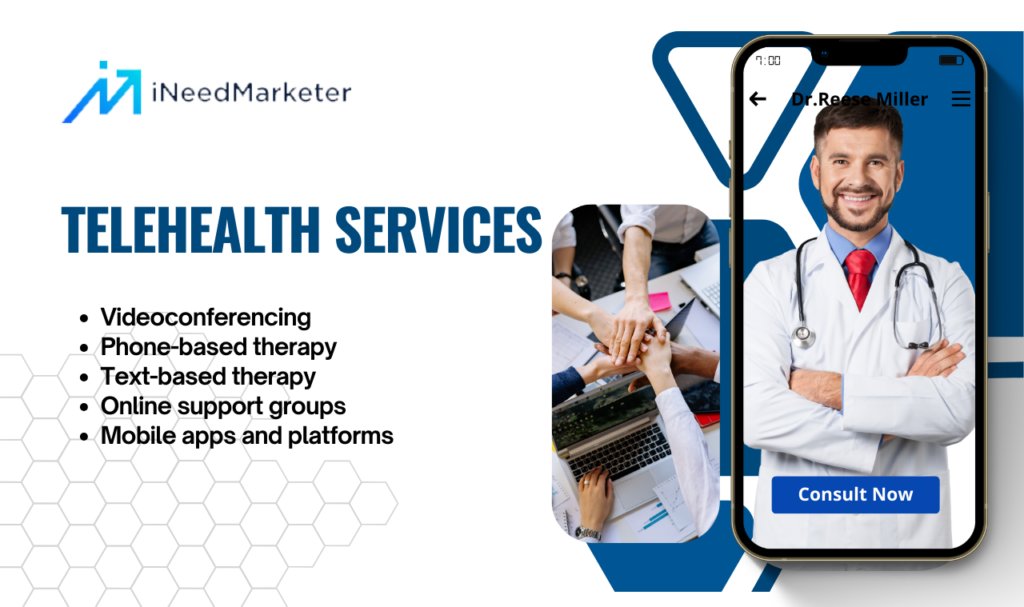In today’s digital age, the website has become an indispensable tool for both professionals and the general public. How Can Website Help Mental Health Doctors? In particular, having a well-designed and informative website can be a powerful asset. Which can help any doctor.
In this blog post, we will explore the ways in which websites can assist mental health doctors in their practice and the benefits they bring to both practitioners and their patients.
Online Presence and Visibility
Having a professional website helps mental health doctors establish a strong online presence. In a world where people often turn to the Internet for information and services. Having a website allows practitioners to reach a wider audience. Patients looking for mental health support can easily find and contact a doctor online, increasing accessibility to care.
Information Dissemination
A website serves as a platform to disseminate valuable information to both current and potential patients. Mental health doctors can use their websites to educate visitors about various mental health conditions, treatment options, and the importance of seeking help when needed. By providing reliable information, doctors can contribute to mental health awareness and reduce stigma.
Appointment Scheduling
One of the most practical benefits of a website for mental health doctors is the ability to offer online appointment scheduling. This feature simplifies the process for patients, allowing them to book appointments at their convenience. Online scheduling can also reduce the administrative workload for doctors’ offices, freeing up time for patient care.
Currently, mental health or health services websites are a very popular medium for doctors. Because, in the current technology era, no one is left behind. Everyone has become online dependent. So you also need to have a healthcare website. But you are looking for a service provider on the website. Don’t worry, we will provide you with the best website for you. To learn more about our service, just click here..
Telehealth Services

The rise of telehealth has transformed the way healthcare services are delivered, and mental health care is no exception. A website can facilitate the provision of telehealth services by providing secure video conferencing options. This enables doctors to connect with patients remotely, expanding their reach and making therapy sessions more accessible to those who may have geographical or mobility constraints.
What are telehealth services for mental health?
Telehealth services for mental health, often referred to as teletherapy or online therapy, are mental health services provided remotely through telecommunications technology. These services allow individuals to access mental health support and treatment from licensed mental health professionals without the need for in-person appointments. Telehealth services for mental health can take various forms, including:
- Videoconferencing: This is perhaps the most common form of teletherapy. It involves real-time, face-to-face sessions with a mental health provider via video calls. It allows for a more personal and interactive experience, similar to traditional in-person therapy.
- Phone-based therapy: Some telehealth providers offer therapy sessions over the phone. While it lacks the visual component of videoconferencing, it can be an effective way to receive support when video is not feasible.
- Text-based therapy: Text-based therapy involves exchanging messages with a therapist through a secure messaging platform. This method can be convenient for individuals who prefer written communication and can be asynchronous, meaning you don’t have to be online at the same time as your therapist.
- Online support groups: These are group therapy sessions conducted via videoconferencing or chat platforms. They provide a sense of community and shared experiences, which can be particularly beneficial for certain mental health issues.
- Mobile apps and platforms: There are various mobile apps and online platforms that offer mental health support through self-guided programs, chatbots, or virtual therapists. These can provide resources, coping strategies, and exercises to manage mental health concerns.
Telehealth services for mental health offer several advantages
- Convenience: They eliminate the need for travel, making therapy more accessible for individuals with mobility issues or those in remote areas.
- Anonymity and privacy: Some people find it easier to open up about their mental health concerns in the privacy of their own home.
- Reduced stigma: Teletherapy can help reduce the stigma associated with seeking mental health treatment, as it can be done discreetly.
- Access to specialized care: Telehealth can connect individuals with mental health specialists who might not be available in their local area.
It’s important to note that the effectiveness of telehealth services for mental health has been well-documented, and they have become increasingly popular, especially in situations like the COVID-19 pandemic, which limited in-person interactions. However, the suitability of teletherapy may vary depending on individual preferences and the nature of the mental health condition. It’s crucial to work with a qualified mental health professional to determine the most appropriate treatment approach for your specific needs.
Blogging and Education
Many mental health professionals choose to maintain blogs on their websites. These blogs can be used to share insights, tips, and resources related to mental health. By regularly updating their blogs, doctors can establish themselves as experts in their field and provide valuable guidance to individuals seeking information and support.
Patient Resources
A well-structured website can include a dedicated section for patient resources. This can include articles, videos, self-help tools, and links to support groups or crisis hotlines. By providing these resources, mental health doctors can empower patients to take an active role in their well-being and recovery.
Here are some patient resources

- Family support
- Financial stability
- Health insurance
- Access to transportation
- Community services
- Supportive friends
- Education and knowledge
- Coping skills
- Access to healthcare providers
- Social network
Client Testimonials
Including client testimonials on a website can build trust and credibility. Patients often rely on the experiences of others when choosing a mental health professional. Positive testimonials can help potential clients feel more confident in their decision to seek treatment with a particular doctor.
Privacy and Security
Websites for mental health professionals must prioritize privacy and security. Ensuring that patient data is protected and that online interactions are secure is paramount. So it is important to maintenance your website. Compliance with legal and ethical standards, such as HIPAA in the United States, is essential when offering online services.
Check out the best monthly website maintenance services to click here
Conclusion
In an era where digital tools play an increasingly significant role in healthcare, having a website is not just a luxury for mental health doctors; it’s a necessity. A website can enhance a practitioner’s online presence, provide valuable resources to patients, streamline administrative tasks, and expand the reach of mental health services through telehealth. By harnessing the power of the internet, mental health doctors can better serve their patients and contribute to improving mental health awareness and access to care in our society.
